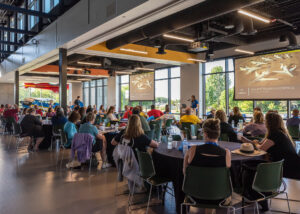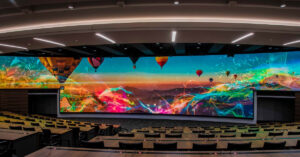
Are Bluetooth or WiFi Assistive Listening Systems ADA Compliant?
Published September 27, 2021
Question: Are Bluetooth or WiFi assistive listening systems ADA compliant?
Answer: No, WiFi and Bluetooth ALS are not currently ADA compliant systems.
The reason WiFi and Bluetooth systems are not compliant is because they require users to bring their own device (known as BYOD), such as a smart phone or a tablet, in order to participate and hear the audio. ADA requires facilities to provide the receivers to the user to be ADA compliant. Per section 219 of the latest ADA standards:
219.3 Receivers. Receivers complying with 706.2 shall be provided for assistive listening systems in each assembly area in accordance with Table 219.3. Twenty-five percent minimum of receivers provided, but no fewer than two, shall be hearing-aid compatible [accomplished by a plug-in neck loop instead of the typical headphones] in accordance with 706.3.
The University of Virginia published a great article reviewing the limitations of Bluetooth and WiFi. Bluetooth is a short-range protocol designed for one-to-one connection. Bluetooth can be a significant drain on user’s phone’s batteries. It is not suited for such large spaces requiring ADA compliance such as an auditorium, gym, or sanctuary.
While WiFi is certainly capable of covering such large areas, the University of Virginia determined the current manufacturers devices do not have high enough security for integration into the greater network.
As for usability, users of hearing aids who are older, and among those who most often experience hearing loss, tend to experience the most challenges using smart phones. If users can figure out the smart phone app, WiFi and Bluetooth often introduce noticeable delays to the audio signal. This can lead to a mismatch between what is seen and what is heard for attendees. This can be very disorienting and affect the older person’s already compromised speech understanding.
In reality, WiFi and Bluetooth are still in their infancy compared to traditional assistive listening technology. Further development, testing, and peer review are required to provide comparable services to an inductive loop, commonly known as hearing loop, infrared, or radio frequency system. Someday WiFi and Bluetooth may be improved but as the compliance is currently written, they are not acceptable.
Consumer studies have confirmed that people with hearing loss overwhelmingly prefer using hearing loops. For a list of places in Wisconsin with hearing loops, visit the Loop Wisconsin website.
Need help making your space ADA compliant? Send us a message to get a free design consultation for an assistive listening system.
Get Expert AV Assistance
Latest Blogs
About Arrow AV Group
We are a premiere audiovisual integration firm serving corporate, government, healthcare, house of worship, and education markets with easy-to-use solutions that drive success. Family-owned and operated from Appleton, WI for over 35 years.





